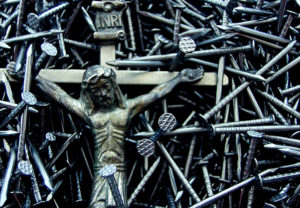
Desensitized to the Reality of Sin & Evil
The truth is that sin and evil exist. You and I would undoubtedly agree that murder, rape, and stealing are all evil. They were evil to your grandparents and they will be evil to your grandchildren. Whether or not you participate in any of these evils doesn’t change the truth, the reality that they are in fact evil. They have always been evil and they will always be evil. As nice as you make them sound, they still remain evil.
The problem we face in our culture is that evil has been glamorized to the point that many people have come to see evil, not necessarily as good, but as necessary, acceptable, and a natural part of life. We have become desensitized to evil, to sin. We take pleasure in watching scenes of violence and murder in the latest action movies, in fact, we pay top dollar to get a bigger screen and higher definition so that we can see the blood spatter out of the gun shot wounds and on surround sound home theater systems so that we can hear the bullets flying by our heads.
You can’t say sin and evil don’t exist. You see them and their effects all over the nightly news. Kids bullying other kids to the point that they drive them to suicide. Adolescents walking into schools and shooting children to death. Men hijacking airplanes and crashing them into buildings killing countless people. If that’s not evil, then I don’t know what is.
The Fast and the Victorious
It’s one thing to acknowledge that sin and evil exist. It is another thing to acknowledge that you yourself are an instrument of that evil, a sinner (Rom 3:22). It hurts to be made aware of your imperfections, your mistakes, your sins. The feelings of shame are natural. The resistance can be strong and the temptation is often powerful.

“Where sin increased, grace overflowed all the more.”
The ancient practice of fasting helps us to become aware of the sins we have allowed to become a part of our lives, or in some cases, take control of our lives. Through fasting we learn to say no to those things which lead us to sin and we build up our tolerance to temptation. Self-denial helps us to grow in self-control to the point of self-mastery. By denying ourselves we master ourselves (Mt 16:24). We conquer evil and sin. With God’s grace we are victorious (Rom 8:37)!
The Truth Will Set You Free
As Christians we believe that the truth is not only a concept or idea. We believe that the truth is a person, Jesus Christ. He said Himself that He is “the way, the truth, and the life (Jn 14:6).” To know Jesus is to know the truth. And in finding the truth you find freedom.
“And you will know the truth, and the truth will set you free.”

When you sin, you might think you are free because you’re making your own decisions and living your life as you choose, but you’re actually a slave to your sins, your vices, and your addictions. Sin has the ability to blind you from it’s negative effects. You’ve experienced it yourself. Everything that is bad for us often seems so good. Sexual promiscuity seems like a great thing until you contract sexually transmitted diseases. An addiction to alcohol or drugs can make you feel good until you overdose in a bathroom stall or find yourself curled up around the toilet in a puddle of your own vomit.
You know right from wrong, thanks to the gift of conscience. But when your conscience is malformed it becomes more and more difficult to weigh the pros and cons. Oftentimes, the pleasure of certain sins seems to outweigh the effects. There are always side effects. And in this case, they are grave. We didn’t arbitrarily decide to call certain things sins. Sins are those things that little by little destroy your soul, your dignity, and your destiny. Sin keeps you from becoming the best-version-of-yourself. Sin separates you from God.
Have Mercy on Me
True freedom comes when you can give up your vices and addictions, when you receive forgiveness from your sins. Of course, in order to be forgiven you’ve got to first acknowledge your sinfulness and then ask for forgiveness. As a Catholic you can experience the free gift of God’s mercy in the Sacrament of Penance. By confessing your sins to a priest, God uses the priest, His servant, to hear your confession and offer to you His mercy which doesn’t just ignore your sin, but erases it forever thanks to Jesus.
“This is my blood of the covenant, which will be shed on behalf of many for the forgiveness of sins.”
Many believe that the Catholic Church’s stance on many of the controversial topics—especially the sexual sins like abortion, contraception, sterilization, in vitro fertilization, homosexual acts, etc.—is too harsh. But the Church only seeks to protect and promote the truth that God has revealed to us for our sake, for the salvation of our souls.
I mean to think that God was willing to become man, suffer excruciating torture, and die a painful death all so that you could be forgiven seems almost fanciful. That is love in the most profound sense of the word. And through this act of love you are invited to experience the mercy of God. All you have to do is ask (Mt 7:7).
Telling the Truth with Love
If you truly love someone, than their eternal salvation, the state of their soul, really matters to you. You want them to know the truth, to be free from sin. So naturally you want to share with them the truth. But there is a thin line between sharing the truth and condemning someone to hell.
Often times, good-meaning Christians will be made aware of the sins of someone close to them and feel obligated to tell them about it. And we are called to admonish the sinner, but we must tell the truth with love. When the woman caught in adultery found herself at the feet of Jesus, He said to her:
“Woman, where are they? Has no one condemned you?” She replied, “No one, sir.” Then Jesus said, “Neither do I condemn you. Go, [and] from now on do not sin any more.”
He doesn’t come down upon her with the fury of a thousand jungle beasts threatening her with the fires of hell. He is aware of her sinfulness—which she too acknowledges as she lays there half-naked at His feet, having nothing to hide and nowhere to hide it—and offers her both God’s mercy and forgiveness, while at the same time admonishing her to sin no more. Notice that God’s mercy comes before the command to sin no more. He forgives her first, then challenges her not to do it again. There is no condemnation. There is only mercy and love.
May the mercy of God touch the hearts of those that are in most need of it.